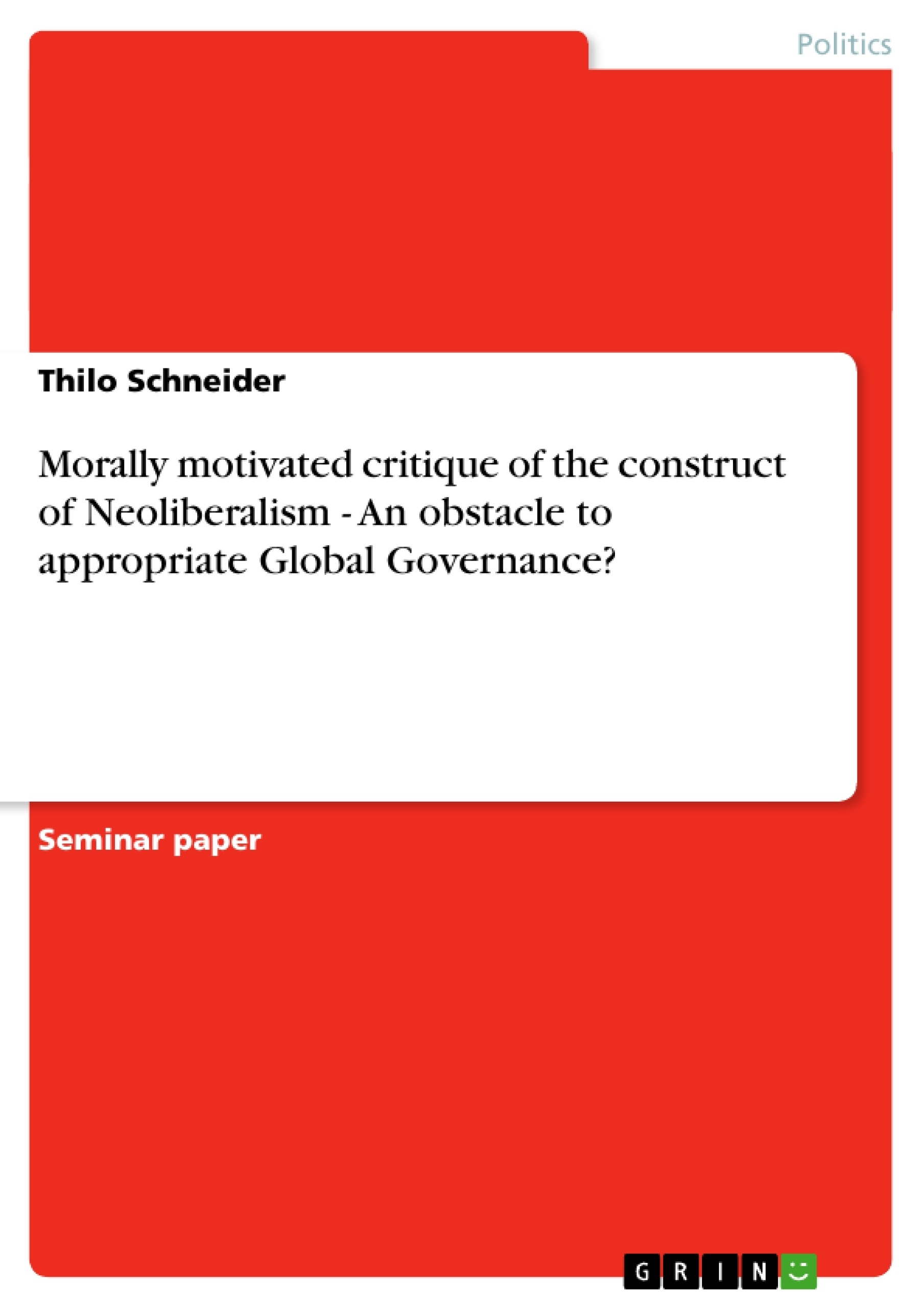As Globalization and Neoliberalism are mentioned in public mass media, these terms are
mainly afflicted with extensive critiques. Neoliberalism is implied an egoist, reckless transfer
of Darwin’s doctrine to Economy in which only the fittest can survive. This so called doctrine
becomes more and more evident.
Besides other definitions of Globalization I will refer to a “general” definition which is
sufficient as a required framework for this paper. I will define it as a term to “describe the
growth and spread in investment, trade, and production, the introduction of new technology,
and the spread of democracy around the world.” (Schaeffer 2003: 1) The degree of
Globalization “would affect not only production, finance, technology, media and fashion, but
also the international political system.” (Archibugi 2004: 438)
The logic of the market has undoubtedly penetrated other subsystems of societies.
In the overall concept of Globalization, Neoliberalism is the economic “Ideology” which
coins globalization. Neoliberalism is “the” constitutive basis, the incentive of Globalization.
Globalization explicitly implies the idea of worldwide free trade and global market economy.
(Cp. Schäfer 2003: 36) „At the end of the twentieth century, it looks clear that there has been
a kind of triumph o global capitalism.” (Langhorne 2001: 16)
This obvious development is frequently criticised all over the world dependent on sociocultural
and structural background of critiques. In Africa targets of criticism are mainly
international institutions like the IMF, World Bank, World Trade Organization or the Group
of 8, banks and stock exchanges in the US, Canada and Europe. (Cp. Wood 2004: 69-75)
This paper intends to elaborate Neoliberalism as the omnipotent market ideology and the
inevitability of an evolutionary process. Outgoing from this thesis, neoliberalist-critics
underestimate the importance of Global Governance as a concept of government on a global
level. Instead, critics misguiding criticize the logic of a working system based on inequality.
Hereafter this paper offers an appropriate concept of Global Governance which might be an
opportunity to deal with apparent negative externalities in the global market system.
Inhaltsverzeichnis (Table of Contents)
- Introduction
- Neoliberalism
- Historic development
- Concluding remarks
- Critics of Neoliberalism
- Critizicing individuality
- Critizising inequality
- How should appropriate Global Governance be designed?
- New developments
- Global Governance - Conception and goals
- Problems of Global Governance
- Conclusion
Zielsetzung und Themenschwerpunkte (Objectives and Key Themes)
This paper critically examines the concept of Neoliberalism and its implications for global governance. It aims to demonstrate how Neoliberalism, as a dominant economic ideology, often undermines the necessary principles of global cooperation and equitable development.
- The historical development of Neoliberalism and its intellectual origins.
- The criticisms leveled against Neoliberalism, particularly regarding its impact on individual freedom and social equality.
- The role of global governance in addressing the negative externalities of Neoliberalism, such as inequality and environmental degradation.
- An exploration of alternative models for global governance that promote greater fairness and sustainability.
- The interplay between market forces, individual action, and collective responsibility in shaping global development.
Zusammenfassung der Kapitel (Chapter Summaries)
- Introduction: The paper introduces the concepts of Globalization and Neoliberalism and outlines their interconnectedness. It highlights the prevalent criticism of Neoliberalism, emphasizing its perceived egoistic nature and implications for global governance.
- Neoliberalism: This chapter delves into the historical development of Neoliberalism, tracing its roots to Enlightenment philosophies and classical economic theories. It examines the key proponents of Neoliberalism and their contributions, including Adam Smith, David Ricardo, Milton Friedman, and Friedrich Hayek. The chapter also discusses the rise of Neoliberalism as a dominant economic ideology, particularly in the aftermath of the Bretton Woods system collapse and the 1973 oil crisis.
- Critics of Neoliberalism: This chapter explores the main criticisms directed towards Neoliberalism. It focuses on critiques regarding the ideology's emphasis on individual self-interest, its potential for fostering social inequality, and its disregard for collective responsibility. The chapter discusses how Neoliberalism is often seen as a driving force behind global injustices and unsustainable practices.
Schlüsselwörter (Keywords)
This paper revolves around key terms such as Neoliberalism, Globalization, Global Governance, individual freedom, social inequality, market forces, economic growth, sustainable development, international institutions, and ethical considerations. It explores the complex relationship between these concepts and their implications for global governance in the 21st century.
Frequently Asked Questions
What is the main critique of Neoliberalism in this paper?
The paper examines Neoliberalism as a market ideology that often prioritizes individual self-interest over collective responsibility and social equality.
How is Global Governance defined in this context?
Global Governance is presented as a concept of political cooperation on a global level to manage international issues and mitigate negative externalities of the global market.
Which thinkers are associated with Neoliberalism in the text?
The paper traces roots back to Adam Smith and David Ricardo, up to modern proponents like Milton Friedman and Friedrich Hayek.
What are the "negative externalities" mentioned?
These include social inequality, economic injustices, and environmental degradation that often result from unregulated market forces.
Is Neoliberalism seen as inevitable?
The paper discusses the thesis of Neoliberalism as an "omnipotent market ideology" and an evolutionary process, but suggests Global Governance as a necessary counter-concept.
- Quote paper
- Thilo Schneider (Author), 2007, Morally motivated critique of the construct of Neoliberalism - An obstacle to appropriate Global Governance?, Munich, GRIN Verlag, https://www.grin.com/document/68897



